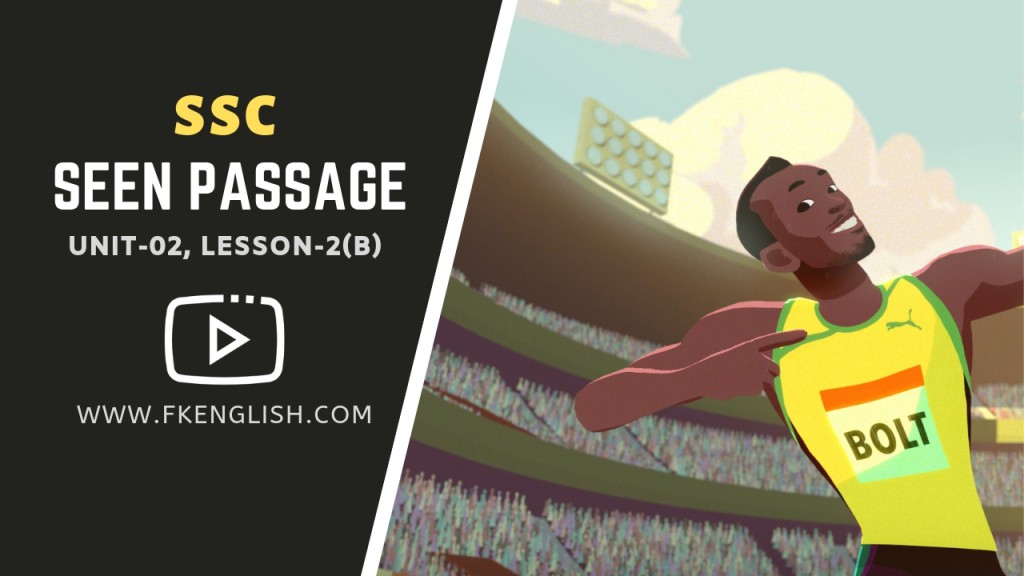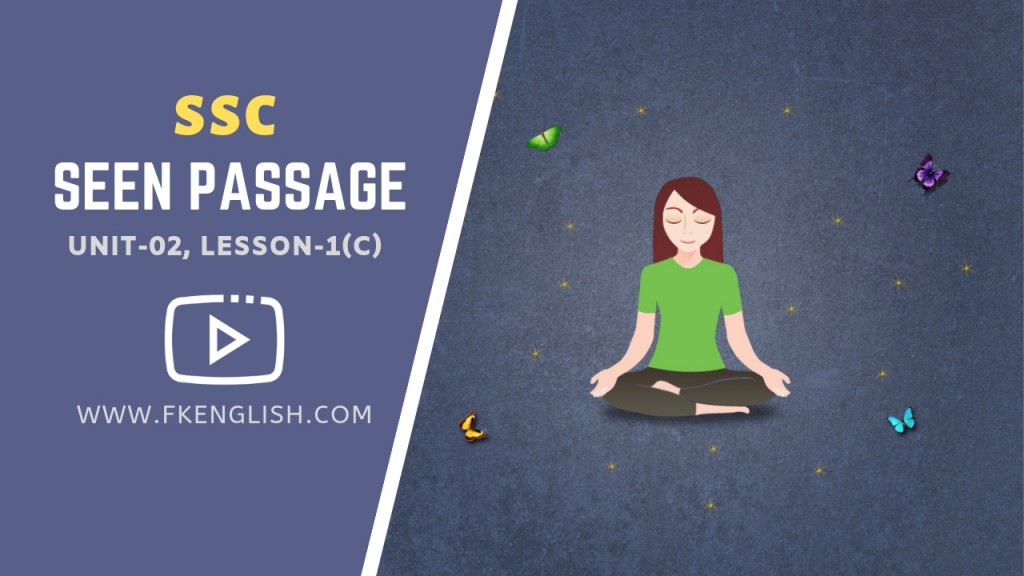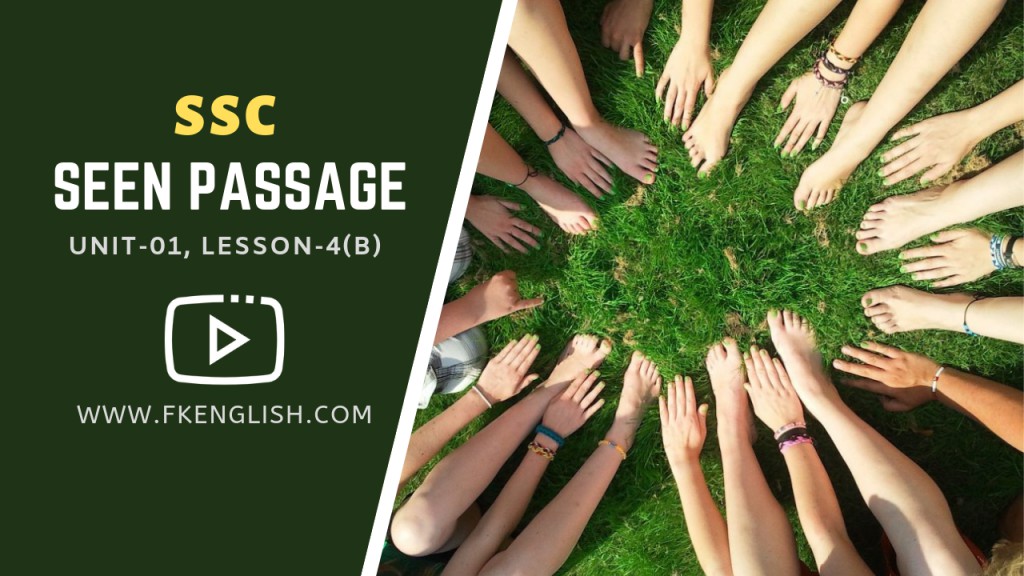SSC ENGLISH SEEN PASSAGE-06 | Traditional childhood pastimes
Read the passage. Then answer the question below.Unit-2; Lesson-3(A)
Traditional childhood pastimes of climbing trees and playing conkers are in decline, according to a survey by the RSPB (Royal Society for the Protection of Birds). It’s a charitable organisation registered in England and Wales.
The survey shows that people under 34 recall far fewer such childhood outdoor experiences than their counterparts over 55, according to a survey by RSPB.
People were asked which of 12 outdoor experiences they could remember during their childhood. The answer included making dens, daisy chains, climbing trees, playing conkers and feeding birds. Four out of five boys climbed trees and the same number of girls made daisy chains. But the survey showed the numbers declining among the newer generations.
Some 15% more of those aged over 55 had these outdoor experiences in their childhood, compared with those between 15-34 years old. Some 92% of the public agreed that experiences of nature were still important to children, and 82% agreed that schools should play a role in providing them to all children.
The survey has highlighted the positive impact of contact with nature on a child’s education, health, wellbeing and social skills. At the same time, there has been a decline in these opportunities, with negative consequences for children, families and society – a condition now known as nature deficit disorder.
Mike Clarke, chief executive of the RSPB, will meet parliament members on Tuesday to urge the government to join other organisations in providing children with first-hand experiences of the natural environment. “We believe this guidance should include the many positive impacts on children of having contact with nature and learning outside the classroom.”
SSC ENGLISH SEEN PASSAGE-06 | Traditional childhood pastimes
1. Choose the correct answer from the following alternative.
A. Which of the following has the closest meaning of the word pastime used in line 1 of the passage?
a. Free time
b. Leisure activities ☑
c. Vacations
d. Holidays
B. What does the term “ nature deficit disorder” used in the last line of the 5th paragraph mean?
a. Negative consequences for those who are deprived of a touch of nature. ☑
b. Positive consequences for those who are out of a touch of nature.
c. Positive consequences for those who are in touch with nature.
d. Negative consequences for those who are in touch with nature.
C. Which of the following statements is true in light of the last paragraph?
a. Nature has hardly any impact on the development of children.
b. Nature plays a single role only in the educational development of children.
c. Children should be kept close to nature for their sound development. ☑
d. Children should be kept in an urban area for their sound development.
D. What does the title of the passage “Childhood outdoor pastimes in decline” mean?
a. Outdoor leisure activities of children are gradually reducing. ☑
b. Children’s outdoor leisure activities are increasing day by day.
c. Children hate outdoor pastime present days.
d. Children deny doing outdoor leisure activities.
E. Which of the following best describes the RSPB?
a. Non-profitable organization ☑
b. Voluntary organization
c. Government organization
d. Children’s organization
F. What does Mike Clarke suggest in the passage regarding children’s education?
a. Children should be given more classroom-based education.
b. Children cannot learn from nature.
c. Nature can play a negative role in children’s education.
d. Nature can play a vital role in children’s education. ☑
G. What is the main purpose of the author of this passage
a. To highlight the impact of the natural environment on children’s mental and physical development. ☑
b. To highlight the importance of indoor leisure activities of children.
c. To show children’s attitude to classroom-based education.
d. To urge the parliament to allow children to play outdoor sports.
H. Which of the following has the closest meaning of the word ‘charitable’ used in line 3 of passage?
a. Non-profitable ☑
b. Governmental
c. Non –governmental
d. Voluntary
I. Which of the following is a boys leisure activity according to the survey of the RSPB?
a. Daisy chain
b. Marking dens
c. Climbing tree ☑
d. Freeing birds
J. Which of the following leisure activities do the girls prefer to do according to the survey of the RSPB?
a. Climbing trees
b. Playing cankers
c. Making dens
d. Daisy chains ☑
K. Which of the following best describes the relationship between the natural environment and children?
a. Positive impact ☑
b. Negative impact
c. Negative consequences
d. Indoor pastimes
L. According to the 5th paragraph of the passage, which of the following statements is true?
a. At present children are getting less opportunity to play outdoor games. ☑
b. At present children pass more time with nature than before.
c. Presently children are recovering fast from nature deficit disorder
d. Nature does not bear any positive impact on children’s development.
M. What does the expression traditional childhood pastime used in line 1 of the passage mean?
a. Conventional leisure activities of children ☑
b. Conventional favourite sports of children
c. Traditional games and sports of children
d. Children’s traditional holidays
SSC ENGLISH SEEN PASSAGE-06 | Traditional childhood pastimes
2. Answer to the following question.
a. From your reading of the first paragraph of the passage, what do you know about the RSPB and what does it talk about in the passage?
ヅAnswer: RSPB stands for Royal Society for the protection of Birds. It is a charitable organization registered in England and Wales. In the passage, it talks about childhood outdoor pastimes which are in decline nowadays.
b. What is the finding of the survey of the RSPB regarding pastimes?
ヅAnswer: The finding of RSPB is that childhood outdoor pastimes are in decline now. As a result, children are more exposed to nature deficit disorder.
c. What is the main conclusion of the survey of the RSPB?
ヅAnswer: The main conclusion of the survey of the RSPB is that there has been a decline in children’s outdoor pastimes. It consequently exposes children to ‘nature deficit disorder’. So they urge to provide children with more opportunities to come in contact with nature.
d. “Some 92% of the public agreed that experiences of nature were still important to children.” Do you agree with the statement? Give your opinion in 2/3 sentences.
ヅAnswer: Yes, I fully agree with this statement. It is because nature has a positive impact on a child’s education, health, wellbeing and social skills
e. Who is Mike Clarke? What does he want to do after the survey?
ヅAnswer: Mike Clarke is the Chief Executive of RSPB. After the survey, he wants to meet the parliament members to urge the government to join other organization in providing children with first-hand experiences of the natural environment.
f. From your reading of 3rd paragraph of the passage, describe what is declining among the newer generation and why?
ヅAnswer: Among the newer generations the first-hand experiences with the natural environment through childhood outdoor pastimes are declining because they are not getting enough opportunities to play outdoor sports in contact with nature
g. Explain the term ‘nature deficit disorder’ in your own words.
ヅAnswer: The term ‘nature deficit disorder’ refers to the negative consequences for children families and society who are not getting enough opportunities to come in contact with the natural environment.
h. What is the main purpose of the author of this passage? Do you agree with him?
ヅAnswer: The main purpose of the author of his passage is to highlight the positive impact of nature on a child’s education, health, wellbeing and social skills. Yes, I fully agree with him because nature plays a vital role in the sound mental and physical development of children.
Watch YouTube Video
SSC ENGLISH SEEN PASSAGE | Traditional childhood pastimes




0 Comments